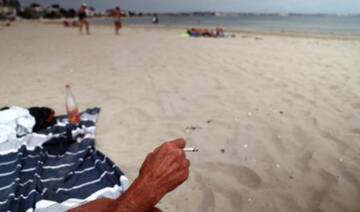KYIV: Russia pounded Ukraine with deadly missiles and drone strikes early on Thursday in a sweeping attack that the US special envoy on Ukraine said undermined President Donald Trump’s peace efforts.
At least 21 people were killed in the capital, city officials said.
White House press secretary Karoline Leavitt said Trump “was not happy about this news, but he was also not surprised,” given that the two countries had been at war for a long time.
Ukraine’s President Volodymyr Zelensky said the strike, the second-largest attack since Russia launched a full-scale invasion in February 2022, was Moscow’s answer to diplomatic efforts to end its war.
US special envoy Keith Kellogg commented on X: “The targets? Not soldiers and weapons but residential areas in Kyiv — blasting civilian trains, the EU & British mission council offices, and innocent civilians.”
The European Union and Britain summoned Russian envoys to protest. There were no reports of casualties at either site.
Zelensky said the strikes also damaged a Turkish enterprise and the Azerbaijan embassy.
Leavitt told a regular briefing that Trump would have more to say about the situation later.
Leavitt said the Russian attacks had been deadly and that Ukrainian attacks had done significant damage in August to Russian oil refineries.
“Perhaps both sides of this war are not ready to end it themselves,” she said. “The president wants it to end but the leaders of these two countries need it to end and want it to end.”
The strikes took place less than two weeks after Trump hosted Russian President Vladimir Putin at a summit in Alaska, a meeting the US president hoped would advance his peace efforts.
“Russia chooses ballistics instead of the negotiating table,” Zelensky said on X, calling for new sanctions on Russia. “It chooses to continue killing instead of ending the war.”
Russia said its attack had hit military industrial facilities and air bases, and that Ukraine had attacked Russian targets. The Kremlin said it was still interested in pursuing peace talks.
Moscow has regularly denied targeting civilians. Ukrainian officials say scores of civilians have died in Russian strikes on densely populated areas in recent months, and thousands since the start of the war.
During the attack on Kyiv, explosions rang out as clouds of smoke rose into the night sky. Drones whirred overhead.
Mayor Vitali Klitschko described it as one of the biggest attacks on the city in recent months. At least 63 people were wounded in the hours-long assault, which damaged buildings in all city districts, officials said.
Across the country, Ukraine’s military said Russian attacks struck 13 locations. National grid operator Ukrenergo said energy facilities were hit, causing power cuts.
A push by Ukraine and its allies to end the invasion has yielded little, despite Trump’s meetings this month with Putin, then Zelensky.
Russia has stepped up air strikes on Ukrainian towns and cities far behind the front lines and pushed a grinding offensive across much of the east in an effort to pressure Ukraine into giving up territory.
’ANOTHER GRIM REMINDER’
“This is another grim reminder of what is at stake. It shows that the Kremlin will stop at nothing to terrorize Ukraine, blindly killing civilians and even targeting the European Union,” EU Commission President Ursula von der Leyen told reporters in Brussels.
She said two missiles had struck near the EU office within 20 seconds of each other.
EU countries would soon come up with a 19th package of sanctions against Russia and were advancing work on how to use frozen Russian assets to help Ukraine, she added.
“We discussed our diplomatic efforts to stop the killings, to end this unprovoked Russian aggression, and to guarantee real security for our people,” Zelensky wrote on X after talks with von der Leyen.
Zelensky also said that he had discussed security guarantees for Ukraine with Turkiye’s President Tayyip Erdogan and they would be set out on paper next week.
British Prime Minister Keir Starmer condemned the assault, which he said had damaged the British Council building. “Putin is killing children and civilians and sabotaging hopes of peace,” he wrote on X.
Ukraine’s military said air defenses downed 563 of nearly 600 drones and 26 of 31 missiles launched by Russia across the country.
Russia’s Defense Ministry said Russian air defenses destroyed 102 Ukrainian drones overnight in at least seven regions.
Ukraine’s drone force said it had struck the Afipsky and Kuybyshevskyi oil refineries as part of that attack.

























